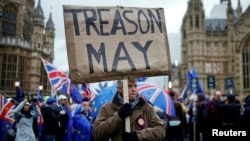British voters were promised that leaving the European Union after half-a-century of membership would be simple. And according to one leading Brexiter, Liam Fox, negotiating a deal with Britain’s erstwhile partners would be the “easiest in human history.”
It hasn’t turned out that way.
Simplicity has given way to complexity and rancorous division, shaking constitutional foundations. Amid the political chaos there are burgeoning concerns about the safety of Britain’s lawmakers.
Last week, as British Prime Minister Theresa May was forced to seek a postponement of Britain’s exit from the European Union, members of Parliament were advised to take taxis home over fears they risked being assaulted by members of the public.
“Personally, I have never felt this level of tension during my time in the House and I am aware that other colleagues feel the same,” the deputy Speaker of the House of Commons Lindsay Hoyle wrote to lawmakers, advising them to take extra security precautions.
“Many colleagues have already been subject to widely publicized abuse and intimidation,” he wrote. He added security measures had been adopted at the homes and constituencies of most MPs.
Increased pressure to step down
This week Brexit could claim the scalp of Britain’s Theresa May, who’s clinging to office amid demands from some of her own Conservative lawmakers to quit. They want a caretaker prime minister to be installed to test different exit strategies. May’s Brexit withdrawal agreement has been rejected twice by parliament and there appears little prospect it will pass, if she brings it before the House of Commons for a third try.
Even the skittish plot to oust her fell apart Sunday, the victim of splits in the Cabinet over who should replace her.
Parliament will try this week to seize control of the Brexit process from a government so divided that it has become powerless.
That would turn Britain’s modern-day constitutional practice on its head and may not resolve anything — it isn’t clear there’s a majority in the House of Commons for any alternative from staying in the EU, to holding a second referendum, to effecting a so-called “soft Brexit,” which would see Britain closely tied to the bloc economically but outside its political institutions.
Accusations of betrayal, treachery
But unnerving British politicians the most is the rising tide of Brexit-related accusations of betrayal and treachery, which is deepening distrust in parliament and risks encouraging violence, they fear.
Lawmakers have found themselves outside Parliament surrounded and jostled by protesters. On social media they are regularly denounced in menacing messages often threatening physical harm.
At the back of lawmakers’ minds is the murder four years ago of Labour MP Jo Cox, who was shot and stabbed to death by a 52-year-old assailant outside a library in her normally placid northern England constituency.
Her killer had a history of psychiatric problems.
Those favoring an exit argue parliament is frustrating the people’s will and they accuse lawmakers of treason. Brexit-backing tabloid newspapers dub those trying to block leaving the EU “enemies of the people” and even the traditionally more sober columnists of the broadsheet newspapers aren’t restraining themselves in taking sides.
The leading Brexiter Nigel Farage has described May’s delay — Britain was scheduled to leave on March 29 — “an outright betrayal.” He has warned darkly of a widening gap between “the people” and politicians.
Calls for new referendum
But pro-EU campaigners point to Saturday’s rally in London calling for a second referendum that attracted a million marchers as an indication public opinion has shifted away from Brexit and people have changed their minds.
They accuse Brexit-favoring lawmakers of intransigence and also of a betrayal of the interests of the people by not abandoning Brexit.
Others fear long-term harm to Britain’s political institutions.
Writing in Britain’s Daily Telegraph, Charles Moore, a former editor of the storied Conservative newspaper and a staunch Brexiter, said political parties promised Britons the 2016 Brexit referendum would be honored and “if parliament now breaks that trust, it undermines the purpose of its existence.”
He added, “It invites us to replace its members and perhaps the institution itself.”
That, say some critics, misunderstands Britain’s unwritten Constitution and where sovereignty lies — not with the people, but with Parliament. Britain’s longest-serving lawmaker Ken Clarke, a Conservative, was critical of holding a Brexit plebiscite in the first place, fearing it would strip from MPs what was rightfully their decision to make.
The tension between parliament and people isn’t new. In the 18th century, philosopher and lawmaker Edmund Burke told the voters of Bristol that an MP was not a delegate, but a representative.
“Your representative owes you, not his industry only, but his judgment; and he betrays, instead of serving you, if he sacrifices it to your opinion,” he said. That principle has long been seen as key for a parliamentary democracy.
If voters are unhappy with their MP, they can always vote them out at a subsequent election. Which is what the Bristol voters did to Edmund Burke.







